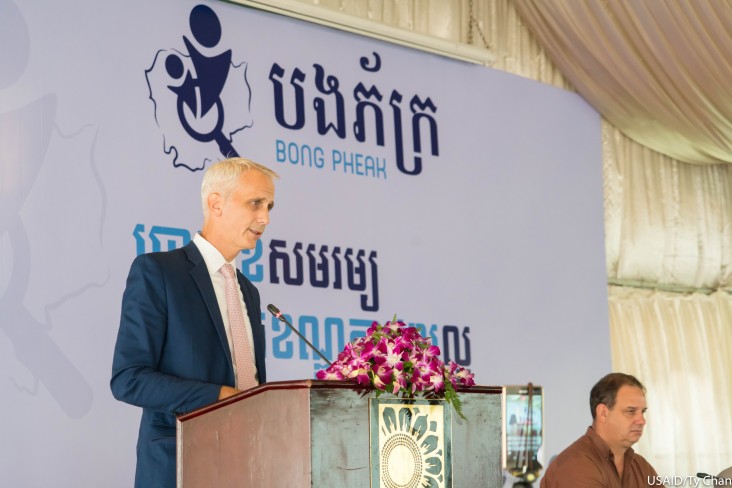
(as prepared for delivery)
- Madame Romserey Leakhena, Deputy Secretary General of the National Committee for Counter Trafficking and Secretary of State, Ministry of Interior;
- Mr. Pim Sophea, Deputy Director of the National Employment Agency (NEA);
- Jaview Solaro, Program Director of the Open Institute
- Distinguished guests, ladies and gentlemen
Good morning to you all. I am particularly pleased to join you today as we take a new step in addressing the international crime of human trafficking which affects millions of people worldwide and many right here in Cambodia.
This is a topic that we take extremely seriously. To quote President Obama: “Our fight against human trafficking is one of the great human rights causes of our time.” The U.S. government cares deeply about trafficking because its effect goes beyond individuals and their families. It also destroys communities and disrupts entire countries, regardless of their location or level of economic development. The fight against it isn’t waged by one organization or a government. We know from experience that strong coordination among governments, civil society, and the private sector is critical for ending human trafficking. That’s why we hope that the NCCT will continue to provide the assistance, protect, repatriate, and reintegrate victims of trafficking as well as continue to provide the leadership and coordination needed to make real progress we can see in human trafficking.
As President Obama said, we consider human trafficking to be a global human rights challenge. It preys upon the vulnerable, breaks down rule of law, and corrupts global commerce. In Cambodia, USAID has been working on countering trafficking in partnership with the Cambodian government for more than a decade. In October 2015, we awarded a new, four-year counter trafficking in persons project to Winrock International. This project aims to address the root causes of trafficking, protect and assist victims who have been trafficked, increase the likelihood of prosecution, and strengthen local governance structures in place to address these crimes.
Fighting against human trafficking is not only about prosecuting perpetrators, which is why we are here today. It is also about preventing vulnerable people from becoming victims. Making sure that potential victims are equipped with skills and provided employment opportunities is the best way to prevent them risking unsafe migration which could lead them to a life of indentured servitude or, indeed, slavery. When you visit villages in the Cambodian countryside there is not one village where no one has migrated. Most villages are only filled with grandparents and children. Their mothers and fathers are abroad working construction, on fishing boats and as domestic helpers. While Thailand has almost one million registered Cambodians working there, one would estimate that there are hundreds of thousands of unregistered Cambodians working in Thailand as well. Why do they go? As a recent report from Emerging Markets Consulting (EMC) stated, many are working abroad because of poverty, no jobs domestically or because of debt. So many seek migrate illegally through unsafe means to find work in Thailand as well as in Phnom Penh and other urban centers. But there are jobs but no knowledge but for openings known by friends and families or worse labor recruiters.
Today, we take another step in that direction with the new job seeking platform Bong Pheak. Developed by the Open Institute, Bong Pheak is Cambodia’s first employment service for low-skilled and unskilled workers including those employed in construction, factories, hospitality and security. It will help these workers to find safe employment within Cambodia. If they can find good work near their families and communities, they are less likely to become victims of trafficking. So it is up to all of us here to promote, advocate, and use this for the people of Cambodia.
In a previous life, I worked with an organization that also protected those that had been trafficked or were made refugees by difficult conditions. The safety of home and the comfort of the familiar – these were the missing elements that left the people that I tried to help so vulnerable to human traffickers. That’s why I’m particularly proud to about Bong Pheak. If we can help Cambodians find work within their borders, we ensure they are close to systems and services that can protect them from the traffickers.
In closing, I would like to recognize once again the important progress the Cambodian government and its partners have made to combat human trafficking of all kinds. We are committed to working closely with the government on this critical challenge in the months and years ahead. Our hope is that one day, when Cambodians seek to migrate to take up new jobs, they can do so safely and legally, and work and live in dignity and without fear of being trafficked.
Thank you very much.
Related Speeches
- Remarks by Polly Dunford, Mission Director, USAID Cambodia, Launch Event of Feed the Future Cambodia Harvest II
- Remarks by Christina Lau, Deputy Director, Office of Public Health and Education, USAID/Cambodia, Opening Ceremony of the Kick-Off Workshop for “One Health Workforce”
- Remarks by Veena Reddy, Deputy Mission Director, USAID Cambodia, EPIC Showcase







Comment
Make a general inquiry or suggest an improvement.